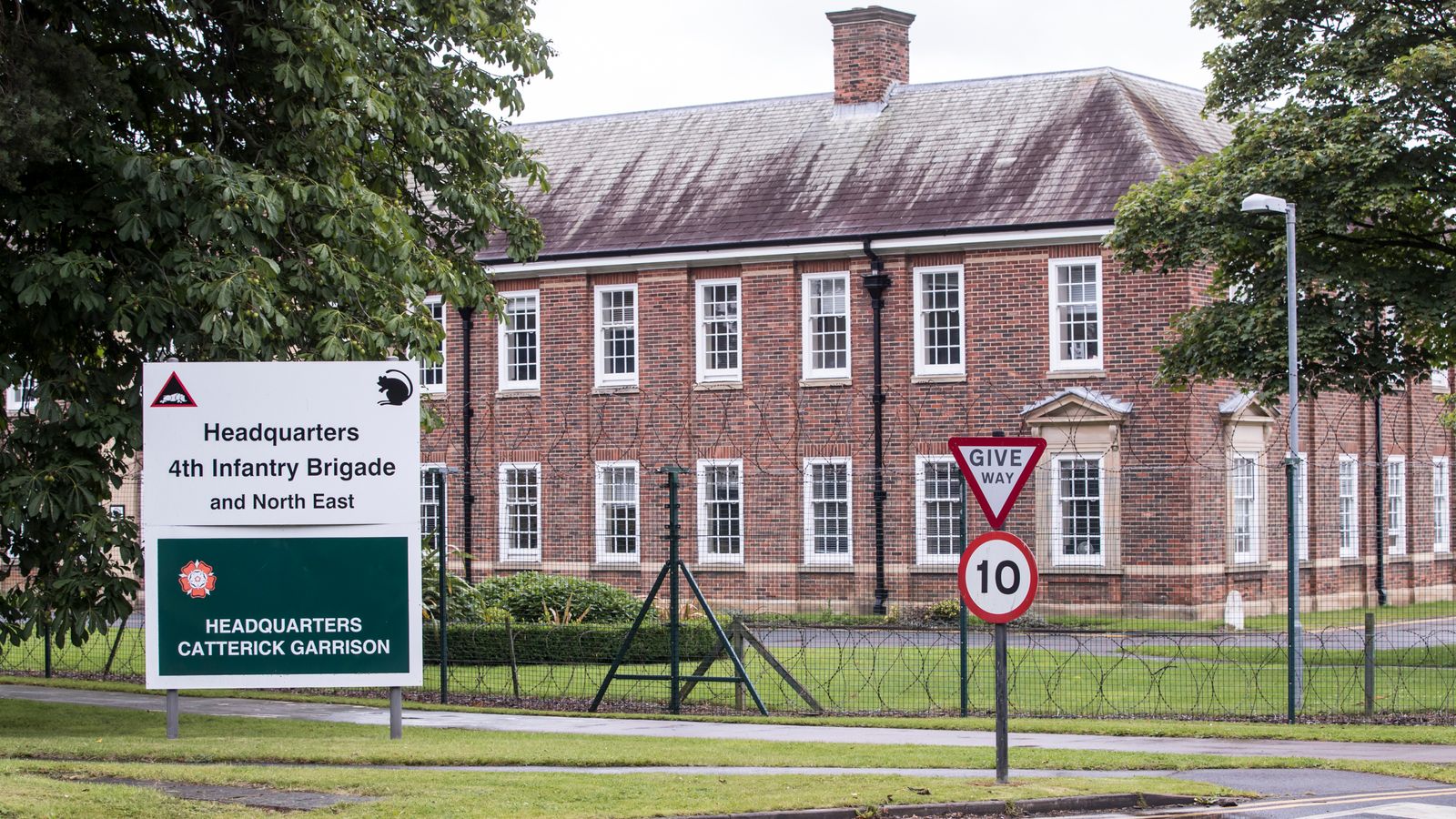Local Tory councils have threatened to take legal action against the government over its plans to house asylum seekers in disused military bases in their areas.
Immigration minister Robert Jenrick confirmed the scheme today, saying “thousands” would be accommodated at former RAF sites in Essex and Lincolnshire.
But Braintree District Council said it was planning to “imminently” apply for a High Court injunction to challenge the proposed use of the Wethersfield airbase amid concerns over the “isolated” location and impact on local services.
And West Lindsey District Council said it was “extremely disappointed” by the plans to use RAF Scampton and was “considering all legal options, including urgent judicial review proceedings”.
Politics latest – Raab gets late Paul O’Grady’s name wrong at PMQs
The new housing plans are aimed at reducing the £6.8m a day the government says it spends on hotel accommodation while acting as a deterrent to prevent Channel crossings.
But charities said the military accommodation won’t stop the small boats and is “grossly inadequate” for people who have fled war.
And Labour said the proposals will not reduce spending “contrary to all of the briefing in the papers”.
Making the announcement in the Commons, Mr Jenrick claimed the use of hotels to house asylum seekers has resulted in a loss of tourism and cancelled weddings, saying: “We must not elevate the wellbeing of illegal migrants above those of the British people”.
He said the new accommodation “should meet their essential living needs and nothing more”, adding: “We cannot risk becoming a magnet for the millions of people who are displaced and seeking better economic prospects.”
The minister said the two RAF sites will be “scaled up over the coming months” to house “several thousand asylum seekers through repurposed barrack blocks and porta cabins”.
And he said Prime Minister Rishi Sunak was “showing leadership” by “bringing forward proposals” to use barracks in Catterick Garrison in his constituency, along with a separate site on private land in Bexhill, East Sussex.
“This government remains committed to meeting our legal obligations for those who would otherwise be destitute but we are not prepared to go further,” said Mr Jenrick.
But he faced a backlash from his own benches, with former home secretary Priti Patel saying the Essex site was not suitable – pointing to another RAF base in North Yorkshire.
She said: “Can I ask why it is deemed appropriate for asylum seeker accommodation to be placed in a rural village in Essex with single men where there is no infrastructure, no amenities, but it was not appropriate for somewhere like Linton-on-Ouse?”
Concerns about the Essex site had previously been voiced by Foreign Secretary James Cleverly, the Conservative MP for the area, though earlier deputy PM Dominic Raab told Sky News his cabinet colleague now “fully supports” the policy.
Sir Edward Leigh, the Conservative MP for the proposed site in Lincolnshire, also said using the former home of the Dambusters RAF squadron could jeopardise a £300m regeneration project to convert it into a heritage site.
He said the decision was “not based on good governance but the politics of trying to do something”.
Transport minister Huw Merriman said voters in his Bexhill constituency would have “great concern” about plans to house asylum seekers in the former Northeye prison turned training centre.
The site is expected to need a considerable amount of work to make it suitable for up to the 1,200 people the Home Office intends to house there.
“I know that this decision will have an impact on local authorities and public services. It will also be of great concern to local residents,” Mr Merriman said.
Political correspondent
As expected, Robert Jenrick today announced plans to house asylum seekers at disused RAF sites in Lincolnshire, Essex, and a former prison in East Sussex, instead of hotels.
He is addressing a subject many Conservative MPs feel very strongly about – one texts to say it is “about time” the government addresses the “hotel problem”.
It is estimated housing migrants in hotels costs the taxpayer almost £7m a day, but there are still plenty of questions about the workability of alternative accommodation.
Local councils are launching legal threats, and transport minister Huw Merriman has said he will be meeting the Home Office to “take forward local concerns”.
Immigration minister Mr Jenrick says the accommodation will “meet essential living needs, nothing more”.
The government hopes the new sites, including a former prison and military training camp, will act as a deterrent, and we understand they will be largely for new arrivals.
In the short-term at least, there is no prospect of moving the thousands of people already in hotels, but Mr Jenrick’s words today certainly send a message.
Opposition MPs also criticised the announcement, with Labour’s Yvette Cooper calling it an “admission of failure”.
“Maybe that’s why the home secretary has asked the immigration minister to make it instead,” she quipped in a dig at her government counterpart Suella Braverman.
Ms Cooper said the Conservatives promised four years ago to halve Channel crossings but “they’ve gone up 20 fold since then”, while more hotels have opened up despite repeated promises to stop their use.
“The asylum system is broken because they broke it,” she said.
“They have let criminal gangs rip along the channel. People smuggler convictions have halved in the last four years, even though more boats and more gangs have been crossing. And yet Tory MPs voted against Labour’s plan for cross-border police units to go after the gangs.”
Read more: Sunak could turn the Tories’ chances around – but his party aren’t sold on him yet
There was also anger from charities, with Amnesty International UK describing the government’s argument that its plan will put migrants off travelling to the UK as “utter nonsense”.
Speaking to Sky News, the charity’s refugee and migrant rights programme director, Steve Valdez-Symonds, said: “People don’t get into dangerous boats or on the back of lorries and make dangerous journeys and put themselves in the hands of, quite frankly, very dangerous people on the basis of trying to get some meagre accommodation in a hotel, stuck in limbo in the UK’s asylum system.”
He added that the plan to house migrants on military bases “reflects a continuing failure by the government to simply get a grip on deciding the claims of people who arrive in this country and make asylum claims, something that it’s determined to stop doing, which is why we have this big backlog, and why it is constantly flailing around for places to accommodate people”.
The Home Office is also “continuing to explore” controversial plans to use vessels as a form of accommodation while asylum claims are being processed, Mr Jenrick said, comparing such schemes to those in Scotland and the Netherlands.
The announcement was met with cries of “it’s not the same” from Scottish MPs.
In Scotland, cruise ships have been used to house Ukrainian refugees fleeing the war.








